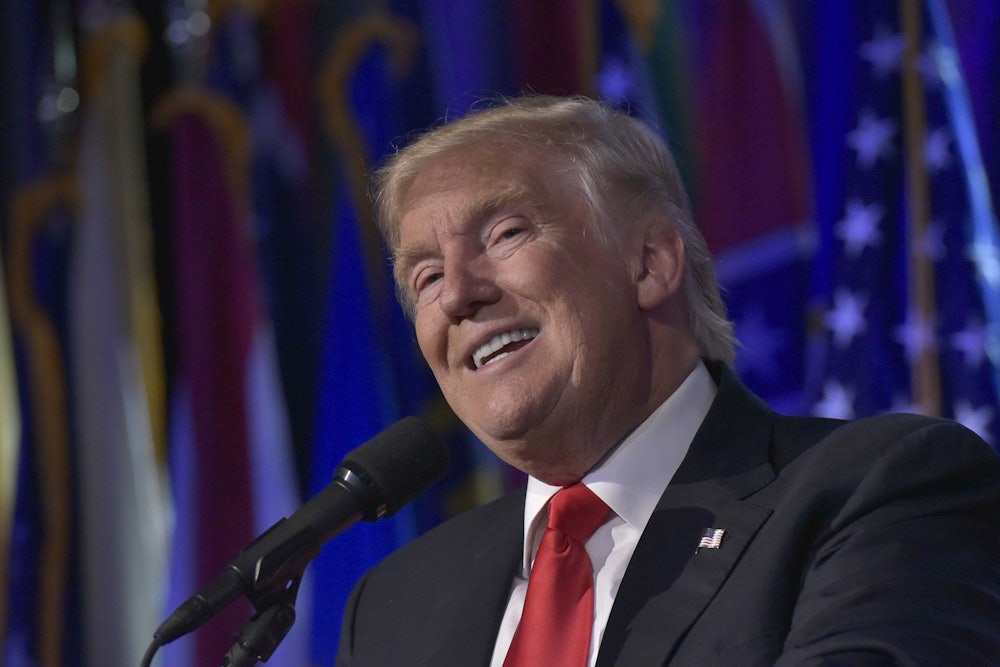The depth of potential horrors in Donald Trump’s presidency is nearly bottomless.
He thinks he knows more than experts when he knows next to nothing of relevance to policymaking and governance. He thinks it’s none of the public’s business whom he’s indebted to, or whether his policies (or merely his status as a U.S. president with a huge interest in a privately held company) are sources of personal enrichment for him. And then there’s his temperament, which, as many rightly said over the course of the campaign, makes him unfit for office. But that unfitness isn’t limited to the obvious, headline-making antics that should’ve been disqualifying. It extends down to the most mundane aspects of the job.
As Trump’s presidency becomes a reality, this is what I’m most chronically anxious about. His tendencies are diametrically opposed to those that the job requires, and the risks we face are therefore unpredictable.
Most of us know the worst-case scenarios, Trump’s most frightening traits. He’s sanguine about nuclear proliferation. When he faces setbacks, or when he has his back against the wall, he lashes out at scapegoats. But in a way, it’s scarier to imagine how quickly the affronts will pile up simply by doing banal things.
Read enough about the presidency or do enough reporting on it, and you find that a huge amount of the day-to-day requires close reading, attentive listening, and measured speaking. The president gets a daily intelligence briefing about key global conflicts and risks to the homeland. The president meets with interest groups and stakeholders. The president must be well briefed on a variety of important things happening in the government, and then use steady judgment to make decisions about how to address them. The president has to read a lot, about many different things.
If you want to feel very bad about how Trump will manage these tasks, go back and read reporting from September and October about how un-coachable Trump was ahead of presidential debates. Trump has no focus. Trump likes to watch cable news and tweet. But the job he is about to enter will confront him with daily nuisances and provocations. It will make even routine governing dysfunctional. It will also provide a steady stream of new people to scapegoat or single out for retribution on a rolling basis.
Trump is going to enter office with a huge mismatch between power (complete control of government) and public consent to his vision of governance. Trump lost the popular vote, but stands poised to upend the policy status quo with huge changes to foreign and immigration policy, to say nothing of the radical tax and spending bills the Republican-controlled Congress might send him. People are already protesting his as-yet-unconstituted administration. The routine of his presidency will center disproportionately on this kind of conflict—the backlash to his victory, his intolerance, and eventually his policies. Rather than learn, understand, adapt, and change, he will attack, dissemble, scapegoat, use government power to exact revenge.
That’s just during a typical, uneventful week. As president, he will also be briefed as needed about natural disasters and important global developments, and his administration will be expected to spearhead emergency management responses. He will be briefed every time there is a domestic mass casualty attack, including when the shooters or bombers are Muslim.
His ability to cope with these challenges will be the subject of intense scrutiny, and when he comes up short (as all presidents inevitably do, and Trump seems unusually likely to) he will reflect the blame back on the communities touched by the crises. Violence will be laid at the feet of imaginary turncoats who refused to rat out their friends and neighbors; mishandled disasters will be the fault of underlings, city and state governments, and victims. His radicalized supporters will at times turn to vigilantism, as if his pronouncements (perhaps intended to shield himself from narcissistic injury) were implicit permission to seek retribution.
Terrible things can snowball, just from routine responsibilities. Nearly every day will create the possibility of a new cascade. And then he could also start a war.
